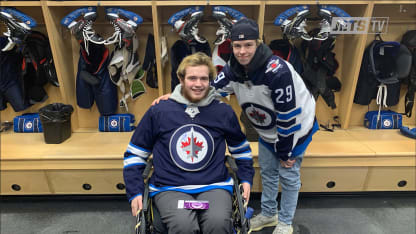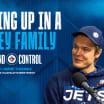As a youth, one of the key moments you look forward to in life is gaining true independence through a driver's license. For 21-year-old Reese Ketler of Winnipeg, he's had to earn that freedom twice.
Reese was forced into that situation after suffering a serious spinal cord injury during a Manitoba Major Junior Hockey League game on Dec. 19, 2019. Reese went head-first into the boards during a play, initially paralyzing him from the chest down with limited hand function. Support from the hockey community both local and beyond flooded in as individuals and hockey teams ranging from minor teams to the Winnipeg Jets reached out to encourage Reese and his family.
Reese Ketler continues progress over a year after life-changing injury
"A big goal for me was to get my license back and be as independent as I can be."

By
Jason Friesen
WinnipegJets.com
Over a year later, Reese has made a lot of progress. He's recovered some movement below his chest, particularly in his arms and hands, and most recently is back behind the wheel with a specialized system that has him using his hands instead of his feet for the accelerator and brakes.
"A big goal for me was to get my license back and be as independent as I can be," said Reese. "Getting the license was something that gave me much more freedom than I had before because I had to rely on other people to pick me up and bring me places."
FEATURE | Reese Ketler
Reese will be the first to tell you that in the days following his injury, he had his doubts about getting here. Though he received plenty of encouragement and well-wishes, Reese admits to hearing about a lot of things he wouldn't be able to do again. Even when he returned home, he started out needing help moving himself from his chair to his bed at night.
He's come a long way since then.
"When he was first learning to balance himself and learning how to get up from a laying position in the hospital, literally it was a process that took him two or three minutes," said Trevor, Reese's father. "Now it takes him seconds."
"After a little while, you get in control of what your mind is thinking and you go out there and give it all you have and really just spend a lot of time at the gym and keep working at it," added Reese on what his mindset has been. "A year and two months later, and I'm back driving again. You don't realize what you have until it's taken away. There's so much freedom that you didn't realize you had."
Reese's mother April Gobert, who happens to be a physiotherapist, had confidence in her son from the beginning that he would be able to make progress back towards some of the things he was accustomed to doing for a couple of reasons. Firstly, she saw some physical abilities that Reese still had that gave her hope.
"I knew that he could still have a good life," said April. "I knew he would get better. Even in the first few days I felt he had trunk control. It wasn't confirmed, but I felt he had a lot more that was going to come back."
The other reason is because April knows her son well and knows that not much is going to stand in the way of him achieving his goals.
"He's a very determined and stubborn kid," she continued. "All you have to do is tell him he can't do something, and he'll do it. He'll do whatever he wants, he'll just figure out a different way."
Trevor has seen that determination in Reese throughout his recovery too.
"Very early on, Reese said, 'My number one goal is to learn to use and adapt to my new body'. That's the way he referred to it," said Trevor. "His drive right from the start was, 'I'm going to work hard', and his number one goal was, 'I'm going to work hard to get out of the hospital.' The next goal was, 'now I'm going to work hard to gain my mass back that I had before' because he lost a lot of weight when he was in the hospital as well as strength. And then obviously it becomes, 'I want to get my license, I want to go back to school, I want to become more independent'."
Setting those goals has allowed Reese to make progress step-by-step. Though they may seem like small improvements at the time, together they have added up to a serious amount of growth.
Reese's determination was on display early as he overcame some of the challenges that COVID-19 brought to the hospital last spring. He was initially doing two hours of physio work five days a week but got dropped down to one hour a day when COVID hit. Reese wasn't about to let that slow down his recovery. Rather than sit back and wait for his one hour of physio, he took matters into his own hands by getting his own tension bands and doing workouts by tying them to his hospital bed - something he says was as much for his mental health as it was his physical health.
For someone who has been an athlete, that commitment to training comes naturally for Reese.
"I've been training all my life, so being in the gym and doing a lot of this rehab stuff is really nothing new to me because I'd been working out in the gym a lot previously. I feel that I just have a drive and that I want to get better, and the motivation to get better has really increased because I get to have that much more freedom when I'm better."
Reese's injury hasn't only been trying on him, of course, but the whole family. That has brought on some tough times and good times, but overall has brought out the best in each of them. That was immediately obvious to April in the early days after Reese was injured.
"When Reese was in the hospital, his older brother Mitch was awesome," she said. "He'd come in and they'd watch car racing. They really like that, and they were just brothers. It was an escape."
Since then, Trevor notes that the whole family has spent a lot of time together after being thrust into a new way of doing things at home that has created both good and challenging situations.
"We've obviously learned a lot more about each other. We've learned to adapt; we've learned when to say something and when not to say something. Sometimes we need to walk away, sometimes we need to encourage, sometimes we need to push."
You can certainly count on Reese to continue pushing and making himself more independent in his new body. Don't expect him to shy away from getting back into sports either; he's already been experimenting with wheelchair rugby.


















